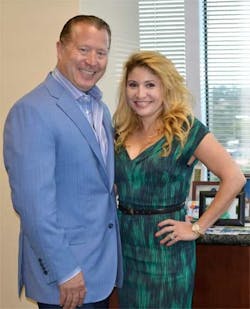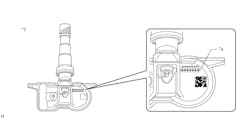Dan Hennelly says he is an extreme micromanager, but he’s not. Even in the early days of Hennelly Tire & Auto Inc., his wife, Diane, set up and ran the back office without his supervision.
He was the store manager for the first The Tire Choice & Total Car Care store in Florida. As the company grew, he was in charge of finding more stores and locations. At one time, he also was one of three district managers, but recently stepped back from that responsibility.
Region Manager Allan Jenkins says Dan takes two steps forward and one step back when it comes to letting go. “At least I’m moving forward!” says Dan, the company’s chairman and CEO. One of his 35 store managers more appropriately describes him as “a funnel” that requires a never-ending supply of knowledge.
Diane Hennelly says she is methodical, and she is. The expectations she has for her employees are clear, because as vice chairman and chief financial officer, she has spelled them out in the policies and procedures she has put into place. She holds everyone accountable, even her husband.
When Operations Manager Joe McPhail recently fell off a ladder while checking inventory, he followed protocol and called Diane. “I’m OK,” he said, declining medical assistance. Did he still have to take a drug test, as required by the company when an accident occurs in the workplace?
“Why don’t you go do it anyway?” she said, answering him in the form of a question.
Dan is the visionary. He imagines what can and, based on his track record, will be. What’s next, 60 stores? 100 stores? The answer to both is “yes.”
Diane brings order to the business world. Black and white is easier to control than gray. An exception to the rule negates it, and requires a new rule.
They complement each other. They are equally responsible for the success of their nine-year-old independent tire dealership. They are the 2013 winners of Modern Tire Dealer’s Tire Dealer of the Year Award.
[PAGEBREAK]
Location, location, location
Thirty-five stores in nine years. Fifty-one million dollars in sales. What are the secrets to the Hennellys’ success?
The first is finding the right location, a talent Dan, 49, honed while climbing the ladder at Morgan Tire & Auto Inc. in a past life.
“When it comes to finding locations, hands down Dan is the best,” says Diane, who once ran her own real estate business. “Sometimes I go with him and the developer when I have time and can get out of the office. They will stand in the middle of a huge piece of dirt, with nothing anywhere for miles and miles and decide, ‘This is it!’ How do they know? Dan is just good at that.”
According to Dan, there are three demographic “targets” he tries to hit when looking for a good Tire Choice location.
1. 75,000 people living in a three-mile radius of the location.
2. Median income of $75,000 per household.
3. Average age under 45.
“We normally do very well when these three numbers come together,” he says. “We also have locations in markets that don’t hit all three marks and are very successful. For example, the average age of people living near our store in The Villages in central Florida is 62, yet the median income is over $90,000.
“I also like to get our stores in front of a high traffic retailer like Publix — our grocery store chain in Florida — Home Depot, Lowes, etc. This works well since our guests can drop off their vehicles with us and go shopping.”
Hiring good people is the second step in running a successful business.
“In my career, I’ve had great locations and the wrong team and not done very well. I’ve had locations that were not very good with a great person, a great leader, and I’ve normally done OK. If I get a great location with a great leader, the store always does amazingly well.”
Pairing the right location with the right people sets the stage for the third equally necessary but not-so-secret to success: customer satisfaction.
“You always have to stay focused on customer satisfaction for the long-term growth of the store,” says Dan. “Hitting a home run but losing because the customer isn’t satisfied gives you a bad reputation. That will never, ever, be part of our culture.
“We all micromanage customer complaints in the company. We’ve got an A+ rating with the Better Business Bureau, which in our industry is almost impossible. We have to earn that every single day.”
Dan defines customer satisfaction as building long-term, repeat customers.
“For every single customer who comes in, an inspection is done just to make sure that the vehicle is OK. We put a professional estimate into our computer system and then make a presentation of needed items only to the customer.”
Any item that a customer declines is noted in another estimate. That same day, the store manager sends the estimate, a discount coupon for needed services, an oil change coupon and a thank-you letter to the customer.
“We want the customers to know that we do appreciate them, that we are going to send them a hand-written thank you,” says Dan. “We also call back every customer and thank them. Our average store services around 25 cars a day, and it takes less than a minute, on average, per call. We’ve found that if we did something wrong, customers are more likely to say something to us if they are away from the store and in their comfort zone. That gives us a tremendous opportunity to immediately regain the trust of that customer.”
Big posters asking for feedback are hung in the showrooms of each store.
“We guarantee that a district manager or a region manager will get back to a customer within 24 hours. We hold our region managers strongly accountable for this, because there is an old adage in our industry: The customer who appreciates the experience will tell one person, while the one who doesn’t will tell 10.”
[PAGEBREAK]
Controlled growth
When the Hennellys opened their first stores in May 2004, their business plan called for 35 stores by 2011. They were a year late. “In 2009, we decided to take a break from opening stores,” says Diane, who graduated with national honors from the University of Miami School of Business Administration. “We were opening up a store every six weeks. You don’t always feel a change in workload when you open one or two stores, at least right away. I just had a feeling it was time to take a break.
“When you grow from five stores to, say, 12 stores, you have to run your company differently. You have to hire and train people. IT (information technology) has to be updated. It’s a challenge. And as you continue to grow, there are more changes.
“Our timing to regroup was perfect, because then the recession hit.”
After opening up store number 35 in November 2012, they decided to regroup again. The two district managers became region managers; they are tasked with hiring their replacements. The number of region and operations managers may be increased soon.
“We now know when we need to make changes,” says Diane. “Spending the whole year not opening up any stores is giving us a chance to prepare for the next stage. That includes revisiting our older stores, replacing old equipment, redoing our IT. That all takes a lot of time.
“I can see how companies have put themselves in trouble, because it’s very easy not to realize you’re headed in that direction.”
Organizational changes
Diane says if she had to do it over again, she and Dan would have hired a couple of right-hand people from the start instead of trying to do everything themselves.
It took them awhile to get the hierarchy right. Originally, they hired two people who acted as both district and operations managers. They soon discovered they needed to separate those responsibilities.
Entering the next phase of their growth, the Hennellys are relying on four others to run the day-to-day operations of The Tire Choice. McPhail and Nery Ruiz are the operations managers under Diane. Jenkins and Steve Powell are the region (formerly district) managers under Dan.
McPhail and Jenkins work together in the 17-store northern region. Ruiz and Powell serve the same roles in the 18-store southern region.
“In a nutshell, I oversee the business policies,” says McPhail. “I manage inventory and make sure everyone is clear on the policies. We hold TNT (Tuesday or Thursday Night Training) sessions four times a month.
“Every time I’m at a store, I always count all the tires and count all the money. I make sure everybody’s doing the right thing. I look out for the company’s best interests.”
Deep down, he knew he would have to take a drug test and fill out a workers’ comp form when he fell off the ladder. “I can’t enforce polices and procedures if I don’t follow them myself.”
McPhail says he and Jenkins talk at least 10 times a day. “We work as a team. He is responsible for personnel matters, but he may use me as a sounding board for advice, such as moving a service manager to a different store. We have the same goals.”
Jenkins, who ran 300 Firestone stores for Bridgestone Americas Inc., tries to visit every store at least once a month. He visits the stores that are having sales difficulties more often. “As a region manager, I have to have a presence in every store,” he says. “The employees have to know you are (aware of) what’s going on. I also follow up on policies and procedures. Even the best stores have a tendency to lose focus from time to time. Not on purpose — they get busy and they lose sight of the processes sometimes. Joe and I bring them back into line.
“And it is important to touch base with all our associates, even in the back shop. We create training and developmental plans for each associate, so you want to hear from the associate, not always the manager. What do they need? What are they looking for? If I don’t try to match our goals with his or her goals, we aren’t growing together.”
When new competition comes into an area, everyone works together to make sure customer service remains at a high level, says Jenkins.
[PAGEBREAK]
“A new store within a three- to five-mile radius means your customer count will deteriorate. You have to make sure you have the cleanest store, the best image. It’s all about the little things: walking customers out to their cars, polishing the tires so they leave with clean, shiny tires. We have to create a competitive advantage.”
Store managers and service managers fall under the supervision of the district managers. Some stores also have sales managers.
“A sales manager at a store is strictly based on volume and the ability to service the customer in the way that we expect,” says Powell. “The sales manager’s primary responsibility is tire and alignment sales, and getting background information about the vehicle to expedite the process for the customer. If there is no sales manager, then typically the manager would be the face of the store, depending on workflow.”
Powell, a former store manager, works “shoulder to shoulder” with Ruiz. He often talks with Dan as well, sometimes about correcting store “issues,” sometimes about marketing anywhere from 45 to 90 days out.
“Recruiting is a big part of what we speak about,” says Powell. “We’re always trying to find the best people so that we can place them and allow them to grow. Part of my responsibility is developing and recruiting talent.”
New store managers start out as MITs (Managers in Training). “We have a few stores that we send our MITs to for training during their first two to three weeks,” says Diane. “Once they are placed at their assigned stores, our operations managers work with the new store managers for two weeks — or more if necessary — to ensure they understand our processes and procedures.”
Arend Ferwerda, store manager at the Oakland Park store near the company’s headquarters in Fort Lauderdale, met Dan when they were working together at Morgan Tire.
“He was much more direct and to the point back then,” says Ferwerda. “He wanted it done a certain way, and that was the way it was going to be done. Now, I think he’s a lot easier to communicate with. We don’t have carte blanche to do whatever we want, but he wants your input.
“The latitude Dan and Diane give store managers allows us to make sure we take care of the customer at all times. I treat the store like it’s mine. I treat my customers like they’re my customers. I think that relationship makes us more like a mom-and-pop shop.”
Scott Biery was waiting tables when a former Tire Choice store manager, impressed by his service, offered him a job. He manages a store in Bradenton.
“You always have to follow the chain of command,” he says. “If it’s sales or customer related, I go to Steve (Powell). If I need a purchase order for a high dollar item or to address any kind of operational issue, I go through Nery. But if I have a concern, I never have a problem picking up the phone and calling Dan on his cell phone. He’s responsible for all the tire orders for all our stores, so if I’m carrying four tires in a size but selling 12 a week, I let him know and he will increase my inventory.
“I feel comfortable calling either Dan or Diane at any time for anything. It’s not like they’re the untouchables.”
‘I was devastated’
The origins of The Tire Choice begin with a Goodyear company-owned store on the south side of Chicago. That’s where Dan started sweeping floors the day before he graduated from high school.
He didn’t know anything about cars, but his work ethic earned him a job as an alignment specialist dedicated to five stores throughout Chicago. Nearly 10 months later, he went to school to become a technician.
“I was a good parts changer,” he says. “I was quick, I was aggressive and my service manager liked that I was very productive.”
The late Jack Tieman, a longtime Goodyear store manager, mentored Dan. “He encouraged me to sell my own tickets. He said I should probably look at getting into sales.”
[PAGEBREAK]
His rise within the company’s sales ranks was rapid: service manager, then sales manager, then the youngest store manager in Chicago. He moved to Kansas City, Kan., and was a region service advisor overseeing 77 stores at 25 years old.
After 18 months, he was moved to Miami as district manager. His immediate goal was to turn 28 former Norton Tire Co. stores into profitable Goodyear stores, which he did. His unexpected goal was to rally Goodyear dealers in the aftermath of Hurricane Andrew on Aug. 24, 1992.
“I’m living in Florida by myself, working seven days a week because I didn’t know anybody in Miami, and Hurricane Andrew hit. I was devastated. I didn’t know what to do.”
The catastrophe left the families of seven Goodyear employees homeless. “I pulled into one store and all the doors were blown off the building. One store was completely destroyed, and it took us years to rebuild it. An employee from our Cutler Ridge store told me how he and his family were in their bathtub with their mattress over their heads when the hurricane hit. They had lost everything.
“It was a tremendously humbling experience. We pulled our team together from Vero Beach all the way down to Miami, and everybody helped each other out. Goodyear helped me get temporary housing for the seven families. It was difficult.”
Diane already had been working at Goodyear’s Miami headquarters as a customer service representative for two years when Dan arrived. He was infatuated with her from the first time they met; she spurned his advances for nearly a year before accepting a dinner invitation.
He was an hour early. She was an hour late (“I couldn’t find the right outfit”). After dinner, they spoke for four hours outside the restaurant. They have been almost inseparable ever since.
The Morgan Tire years
A management change at Goodyear in 1994 led to a crisis of faith that couldn’t have come at a worse time for Dan. With his wedding only months away, he started looking around.
“Merchant’s Tire loved my resume, but I told the HR manager that I was getting married and wanted to stay in southern Florida. ‘The guy who used to run our company just bought a company there a couple months ago,’ he said. ‘You should give him a call.’ So I did.”
That “guy” was Larry Morgan, who had just purchased Don Olson Firestone, a 33-store chain based in Clearwater. After visiting with Tire Kingdom Inc. founder and CEO Chuck Curcio (“He told me, ‘You’re a corporate guy. You’re never going to make it in this business,’” says Dan), he began a 10–year stint at Morgan Tire, where he eventually became president. He oversaw a $1 billion company and 600 stores with Morgan as his mentor.
“He gave me as much as I could handle,” says Dan. “My 10 years at Goodyear taught me corporate structure. Larry taught me the entrepreneurial end of the business: site selection, real estate, negotiating contracts with suppliers, mergers and acquisitions. I learned how to run a business using a P&L statement as a guide.” (When Dan and Diane opened their first stores years later, he quickly learned, with her help, that focusing on cash flow and the balance sheet every month instead of a P&L statement was critical to success.)
In August 2001, Morgan sold a majority interest in his stores to Bridgestone/Firestone Inc. Less than a year later, Dan was out of job.
“There are a couple things that I can do,” he told Diane. “I can go to work for this company, this company or this company, or we can do it on our own.” Diane, six months pregnant with their son, Daniel, said, “Let’s do it together. I’ll give us five years.”
Using their entire life savings, they purchased the first of four Tires Plus franchises. Bridgestone eventually bought them out, and The Tire Choice, 100% owned by the Hennellys, became a reality.
“My motivation was to show I could do this,” says Dan. “One tough night Diane said, ‘Goodyear didn’t make you successful. Morgan Tire didn’t make you successful. You made yourself successful.’”
Dan is highly motivated, says Morgan, CEO of Morgan Auto Group. “He establishes goals and meticulously pursues them. He’s just totally focused. He’s also a good people-person. He recognizes the value of his teammates.
“Diane has the same fire in her belly and the same motivational characteristics that Dan does. She has the same drive to succeed. She’s the strength behind the scenes.
“I’ve never seen a husband and wife so synchronized,” says Morgan. “They have common goals, not just business goals but personal goals as well.”
[PAGEBREAK]
Proper balance (or ‘The Last Lecture’)
“We were talking about work every night,” says Diane. “Then one day during dinner, our daughter, Deanna, says ‘Can you just stop talking about work when you get home?’ That was a turning point for us. We said OK, new rule: no more talk about work when we get home.”
Both Diane and Dan admit that starting their own business was all-consuming. “When we first started, one of our reps told us that from his experience, a business needed to make it past three years to survive,” says Diane. “I was counting those days, and when we hit three years, we threw a party.
“All we did was work, from 6 a.m. to 9 p.m., seven days a week. We’d come home and see our kids for a little while. That’s how we ran for five years. And I struggled with that. When we started, I had just had a baby who I never got to stay home with. When Deanna was born, I stayed home for six months. I stayed home for two weeks with Daniel.”
“We didn’t go on a vacation for five years,” says Dan. “We turned down all the trips suppliers offered.”
They opened up five stores in their first 60 days almost on their own. Diane’s sister, Giselle Lezcano, joined the team as her assistant. She had worked at the call center for Tires Plus while Dan was still there.
“Dan’s work ethic hasn’t changed,” she says. “He and Diane are probably the hardest working people I know. They are very dedicated to this place. They are always here.”
Well, not always. They started taking family vacations every year with Deanna, Daniel and Stephen (Dan’s son from his first marriage). They attend all recitals and ball games.
“I may be in a starched shirt sweating underneath a tree, but I’m at every baseball game,” says Dan. “When Daniel is up to bat, I am right behind him telling him to keep his elbow up and hugging him when he steals home base.”
In “The Last Lecture,” one of Dan’s and Diane’s favorite books, the late Randy Pausch wrote about his last lecture as a professor at Carnegie Mellon. Dying of cancer, he talked about achieving childhood dreams, and left a video legacy for his own young children.
“It’s not about how to achieve your dreams,” he wrote. “It’s about how to lead your life. If you lead your life the right way, the karma will take care of itself. The dreams will come to you.”
Those are words Dan and Diane Hennelly are working hard to live by. ■




